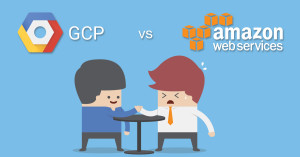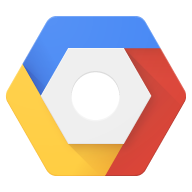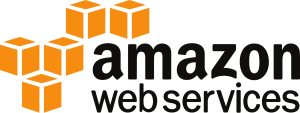
GCP vs. AWS – the decision comes down to cost, innovation and a lot of analysis.
The public cloud wars are heating up more every year. Deciding which cloud provider should run your business is a critical decision, yet one that requires careful analysis. When it comes to GCP vs. AWS, although AWS still holds the highest market share at 45 percent, according to Synergy Research Group, that’s bound to change. The other big players, Microsoft Azure and Google, are working diligently to cut into that market share. Google is growing the fastest at 162 percent in Q2 2016, Synergy reports.
For IT buyers and users, this is all great news. Market competition is driving rapid innovation and lower prices, as demand grows. Vendor revenue from sales of infrastructure products for cloud IT, including public and private cloud, grew by 8.1% year over year to $8.4 billion in the third quarter of 2016, according to IDC. Revenues from public cloud were $5.1 billion, trumping private cloud sales of $3.3 billion. In comparison, traditional infrastructure product revenues declined by 10.8 percent in the same quarter.
Given the proven cost, agility and flexibility benefits, there’s no reason why a company shouldn’t host a significant portion (if not all) of its infrastructure in the public cloud. Still, that doesn’t make the decision of choosing a cloud provider any easier. Once you go through the lengthy process of a cloud migration, it’s unlikely that you’ll want to second guess your move and switch again.
While you may think all cloud platform core services are equal, beneath the covers, the differences pile up. We take a look here by comparing GCP vs. AWS for the enterprise.
Google Cloud Platform (GCP) Overview
GCP excels at supporting developer-centric applications, high compute workloads like data analytics, petabyte scale data processing, and burst computing. Due to Google’s global infrastructure, its scaling is the fastest on the market according to some sources. And GCP has been adopted by major brands, such as Best Buy, Disney Consumer Products Interactive Media, Spotify, Apple, Netflix and Coca Cola. Google uses GCP internally to support high-demand services such as Gmail, YouTube, Maps and Search. Google Cloud is also the force behind many technologies used in cloud projects, such as BigQuery, Kubernetes, AppEngine and Hadoop, the genesis of which was invented at Google. The platform’s big data processing capabilities are a strategic focus for Google, as Sundar Pichai, CEO, said on a recent earnings call: “Machine learning is a core, transformative way by which we’re re-thinking how we’re doing everything.”
Amazon Web Services (AWS) Overview
As the first public cloud service, AWS has a first mover advantage. Currently with greater market share than the other cloud platforms, it carries a “safe bet” perception. As well, AWS remains a popular option because it is familiar—it offers standard processes similar to those in a data center or colocation and it is comfortable for early cloud adopters. AWS can also be managed by Amazon or a third party.
Comparing the Costs
When comparing GCP vs. AWS side by side, economics are still a top reason why companies are moving from internally owned and managed infrastructure to the cloud. Pricing remains a critical differentiator between the various cloud computing platforms. By most measures when comparing GCP vs. AWS, Google comes out on top here. When deployed correctly, applications can be 10-100x less expensive than on traditional infrastructure. It can be a good bit cheaper than AWS. AWS charges by the hour, so you pay the full rate no matter the length of the job. Google Compute Engine bills in minute-level increments with a 10-minute minimum charge. You pay only for what you use.
Google has continuously stated that it will adhere to Moore’s Law when it comes to pricing, and release regular cuts when applicable. GCP also offers a “sustained use discount” wherein at the end of each month, greater VM usage results in a larger percent discount being applied without commitment nor pre-pay. The more you buy, the more benefits you get: that’s a loyalty program straight out of retail.
AWS offers Reserved Instances (RI), but you must pre-commit (with an upfront payment) to a year or more of usage to get the lower fixed cost. Most organizations like the agility of the cloud and don’t want to commit to any service too far ahead of time. Both platforms offer competitive pricing on sparse cloud capacity. AWS’ spot instances require bids while GCP’s preemptible instances have a fixed price.
Platform Differentiators

After cost, it comes down to performance, innovation, and enterprise-friendly features when it comes to GCP vs. AWS. Look for Google to make significant gains in these areas.
GCP:
- Strong developer focus and ability to attract new developers through outreach campaigns.
- Massive scaling capabilities to support global traffic, proven out impressively in supporting its own consumer product/service suite on a rich proprietary technology stack with high reliability standards.
- Focus on exposing technology used internally at Google to the public, such as Machine Learning.
- Clear advantage in big data technologies. As the developer of MapReduce,
Google has domain expertise here, with many new innovations unleashed
recently in the past year, including: BigQuery(managed data warehouse for
large-scale data analytics), Cloud Dataflow (real-time data processing), Cloud
Dataproc (managed Spark), Cloud Datalab (large-scale data exploration, analysis,
and visualization), Cloud Pub/Sub (messaging and streaming data), and Genomics
(for processing up to petabytes of genomic data). - In November 2016, Google announced the general availability of the Cloud Natural
Language API, which uses machine learning to analyze text. Other related
announcements include a price reduction for the Cloud Vision API, which uses
machine learning to analyze images and the Cloud Jobs API, which uses machine
learning to match potential employees with jobs. - Cloud Platform groups usage by project rather than by account. Companies can
create multiple projects under the same account which helps with budgeting and
tracking.

AWS:
- Large user base and partner ecosystem.
- “First-mover” advantage.
- Large service offerings with many new technologies introduced at AWS
Re:Invent; a particular focus on analytics and artificial intelligence. - Ability to collect metrics on usage and create better services.
- Growing strength in database-as-a-service tools, such as PostgreSQL,
to compete with Oracle, SAP and IBM.
Key Takeaways
Given the wide array of technical and business factors involved in purchasing a cloud platform, IT should spend ample time assessing business needs, evaluating the market options, and making the best long-term decision possible. Companies may choose to split the difference, with some infrastructure hosted on one provider and some on another. That introduces complexity, but may deliver benefits around pricing or flexibility.
While Google is currently behind in market share compared to Amazon and Microsoft, the technical benefits of GCP and the cost advantages make it a smart choice for many companies. And, you can bet that Google will continue to invest heavily in growing and improving its platform for enterprise buyers. Google’s pricing is easier to understand and in many ways, GCP is also easier to adopt.
“If you’re new to cloud computing, GCP is easier to get up and running, and the credits make it a tempting platform,” said Michael Li, founder of The Data Incubator, in O’Reilly article. AWS is growing its capacity to maintain market position and it will continue to retain its customers due to its existing reach as long as it can keep up with innovation in the market. Yet Amazon will need to work harder on competitive pricing, once more companies pick up on the cost benefits of GCP.
More than probably any other IT decision, taking ample time to kick the tires of your company’s cloud platform provider is well worth the effort.
Want to learn more about GCP vs. AWS? Click here for a free assessment.



